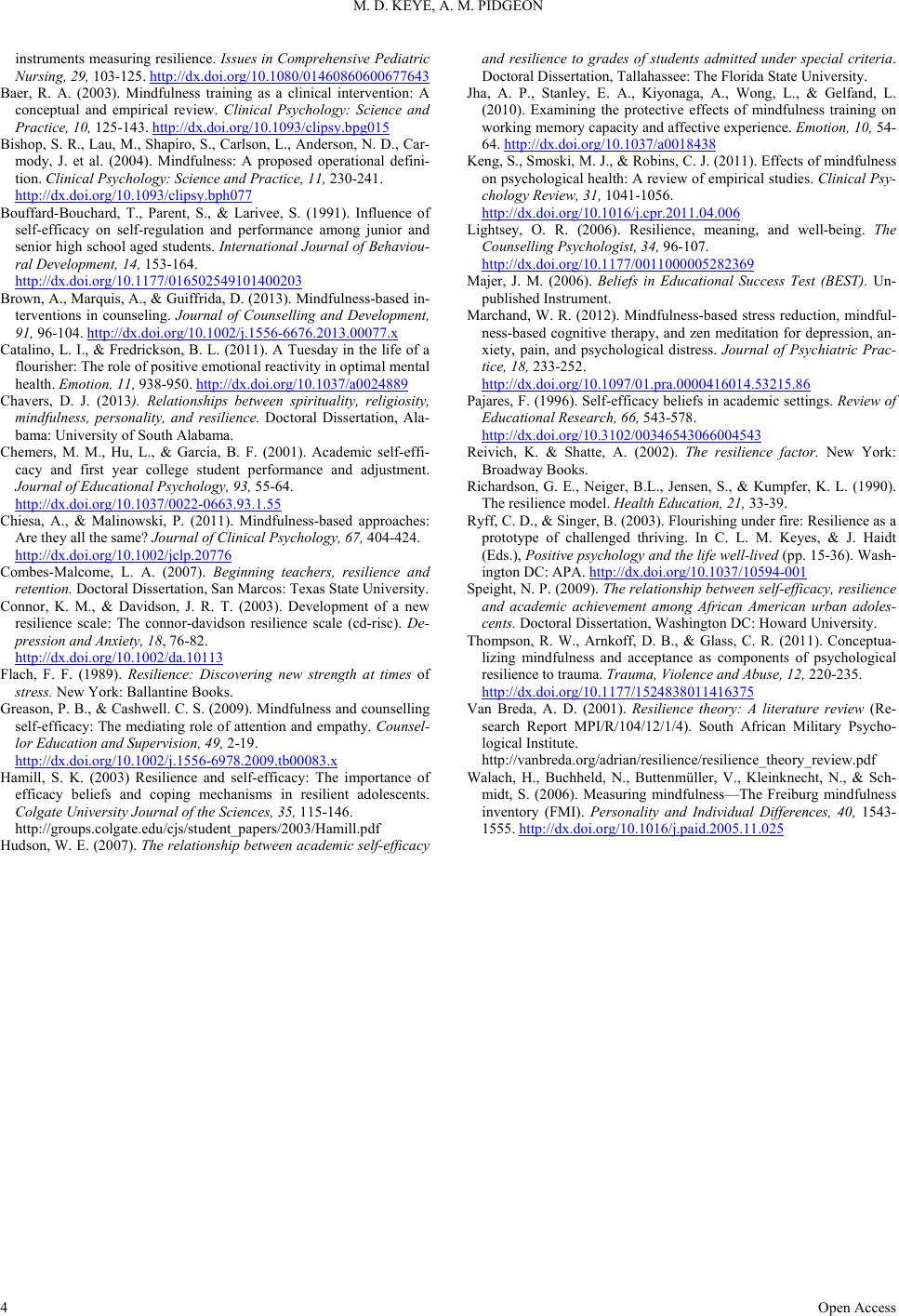
M. D. KEYE, A. M. PIDGEON
Open Access
instruments measuring resilience. Issues in Comp rehensive Pediatric
Nursing, 29, 103-125. http://dx.doi.org/10.1080/01460860600677643
Baer, R. A. (2003). Mindfulness training as a clinical intervention: A
conceptual and empirical review. Clinical Psychology: Science and
Practice, 10, 125-143. http://dx.doi.org/10.1093/clipsy.bpg015
Bishop, S. R ., Lau, M., Shapiro, S ., Carlson, L., An derson, N. D., C ar-
mody, J. et al. (2004). Mindfulness: A proposed operational defini-
tion. Clinical Psychology: Science and Practice, 11, 230-241.
http://dx.doi.org/10.1093/clipsy.bph077
Bouffard-Bouchard, T., Parent, S., & Larivee, S. (1991). Influence of
self-efficacy on self-regulation and performance among junior and
senior high school aged students. International Journal of Behaviou-
ral Development, 14, 153-164.
http://dx.doi.org/10.1177/016502549101400203
Brown, A., Marquis, A., & Guiffrida, D. (2013). Mindfulness-based in-
terventions in counseling. Journal of Counselling and Development,
91, 96-104. http://dx.doi.org/10.1002/j.1556-6676.2013.00077.x
Catalino, L. I., & Fredrickson, B. L . (2011). A Tuesday in the life of a
flourisher: The role of positive emotional reactivity in optimal mental
health. Emotion, 11, 938-950. http://dx.doi.org/10.1037/a0024889
Chavers, D. J. (2013). Relationships between spirituality, religiosity,
mindfulness, personality, and resilience. Doctoral Dissertation, Ala-
bama: University of South Alabama.
Chemers, M. M., Hu, L., & Garcia, B. F. (2001). Academic self-effi-
cacy and first year college student performance and adjustment.
Journal of Educational Psychology, 93, 55-64.
http://dx.doi.org/10.1037/0022-0663.93.1.55
Chiesa, A., & Malinowski, P. (2011). Mindfulness-based approaches:
Are they all the same? Journal of Clinical Psychology, 67, 404-424.
http://dx.doi.org/10.1002/jclp.20776
Comb es-Malcome, L. A. (2007). Beginning teachers, resilience and
retention. Doctoral Dissertation, San Marcos: Texas State University.
Connor, K. M., & Davidson, J. R. T. (2003). Development of a new
resilience scale: The connor-davidson resilience scale (cd-risc). De-
pression and Anxiety, 18, 76-82.
http://dx.doi.org/10.1002/da.10113
Flach, F. F. (1989). Resilience: Discovering new strength at times of
stress. New York: Ballantine Books.
Greason, P. B., & Cashwell. C. S . (2009). Mindfuln ess and counselling
self-efficacy: The mediating role o f attention and empathy. Counsel-
lor Education an d Supervision, 49, 2-19.
http://dx.doi.org/10.1002/j.1556-6978.2009.tb00083.x
Hamill, S. K. (2003) Resilience and self-efficacy: The importance of
efficacy beliefs and coping mechanisms in resilient adolescents.
Colgate University Journal of the Sciences, 35, 115-146.
http://groups.colgate.edu/cjs/student_papers/2003/Hamill.pdf
Hudson, W. E. (2007). The relation ship between aca demic self-efficacy
and resilience to grades of students admitted under special criteria.
Doctoral Dissertation, Tallahassee: The Florida State University.
Jha, A. P., Stanley, E. A., Kiyonaga, A., Wong, L., & Gelfand, L.
(2010). Examining the protective effects of mindfulness training on
working memory capacity and af fective ex perience. Emotion, 10, 54-
64. http://dx.doi.org/10.1037/a0018438
Keng, S., Smoski, M. J., & Robins, C. J. (2011). Effects of mindfulness
on psychological health: A rev iew of empirical stud ies. Clinical Psy-
chology Review, 31, 1041-1056.
http://dx.doi.org/10.1016/j.cpr.2011.04.006
Lightsey, O. R. (2006). Resilience, meaning, and well-being. The
Counselling Psychologist, 34, 96-107.
http://dx.doi.org/10.1177/0011000005282369
Majer, J. M. (2006). Beliefs in Educational Success Test (BEST). Un-
published Instrument.
Marchand, W. R. (2012). Mindfulness-based stress reduction, mindful-
ness-based cognitive therapy, and zen meditation for depression, an-
xiety, pain, and psychological distress. Journal of Psychiatric Prac-
tice, 18, 233-252.
http://dx.doi.org/10.1097/01.pra.0000416014.53215.86
Pajares, F. (1996). Self-efficacy beliefs in acade mic settings. Review of
Educational Research, 66, 543-578.
http://dx.doi.org/10.3102/00346543066004543
Reivich, K. & Shatte, A. (2002). The resilience factor. New York:
Broadway Books .
Richardson, G. E., Neiger, B.L., Jensen, S., & Kumpfer, K. L. (1990).
The resilience model. Health Education, 21, 33-39.
Ryff, C. D., & Singer, B. (2003 ). Flourishin g under fire: Res ilience as a
prototype of challenged thriving. In C. L. M. Keyes, & J. Haidt
(Eds.), Positive psychology and the life well-lived (pp. 15-36). Wash-
ington DC: APA. http://dx.doi.org/10.1037/10594-001
Speight, N. P. (2009). The relationship between self-efficacy, resilience
and academic achievement among African American urban adoles-
cents. Doctoral Dissertation, Washington DC: Howard University.
Thompson, R. W., Arnkoff, D. B., & Glass, C. R. (2011). Conceptua-
lizing mindfulness and acceptance as components of psychological
resilience to trauma. Trauma, Violence and Abuse, 12, 220-235.
http://dx.doi.org/10.1177/1524838011416375
Van Breda, A. D. (2001). Resilience theory: A literature review (Re-
search Report MPI/R/104/12/1/4). South African Military Psycho-
logical Institute.
http://vanbreda.org/adrian/resilience/resilience_theory_review.pdf
Walach, H., Buchheld, N., Buttenmüller, V., Kleinknecht, N., & Sch-
midt, S. (2006). Measuring mindfulness—The Freiburg mindfulness
inventory (FMI). Personality and Individual Differences, 40, 1543-
1555. http://dx.doi.org/10.1016/j.paid.2005.11.025